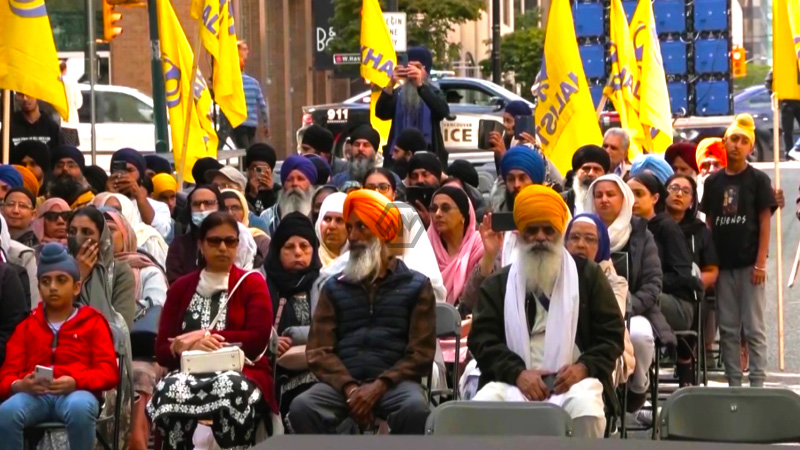- Canada‘s House of Commons observes moment of silence for Hardeep Singh Nijjar, marking his anniversary.
- Pro-Khalistan protests at Indian consulate in Vancouver highlight ongoing tensions.
- Diplomatic strain between Canada and India persists following controversial remarks and ongoing investigations.
In Vancouver, Canada, tensions flared outside the Indian consulate as pro-Khalistan demonstrators gathered, bearing posters demanding justice for Hardeep Singh Nijjar, slain a year ago in British Columbia.
The protest, marked by calls for accountability over Nijjar’s assassination, underscores persistent grievances and complexities in Canada’s Sikh community.
Canadian Remembrance and Protests: Reflecting on Nijjar’s Legacy
Meanwhile, in Ottawa, Canada’s House of Commons observed a solemn moment of silence in remembrance of Hardeep Singh Nijjar’s tragic death. The gesture reflects Canada’s internal political dynamics and its impact on international relations, particularly with India, amid ongoing investigations and diplomatic exchanges.
In Vancouver, Canada, emotions ran high outside the Indian consulate as pro-Khalistan demonstrators gathered in protest. The demonstrators displayed posters demanding justice for Hardeep Singh Nijjar, whose killing a year ago in British Columbia remains a contentious issue within the Sikh community. The protest highlighted ongoing tensions and grievances related to Sikh separatism.
Simultaneously, in Ottawa, Canada’s House of Commons observed a poignant moment of silence to honor Hardeep Singh Nijjar’s memory. The solemn tribute underscored Canada’s commitment to addressing internal political sensitivities and its implications for international relations, particularly with India. The event also emphasized the complexities and challenges in navigating diplomatic relations amid unresolved investigations.
The anniversary of Nijjar’s assassination has further strained diplomatic ties between Canada and India. Prime Minister Justin Trudeau’s previous remarks suggesting possible Indian involvement in Nijjar’s killing sparked controversy and rebuttals from India, labeling the allegations as baseless and politically motivated. The ongoing investigation continues to fuel debate and scrutiny, complicating efforts to stabilize bilateral relations.
Calls for justice reverberated during the commemorative events, with pro-Khalistan groups demanding accountability under international law for those responsible for Nijjar’s death. The protests and parliamentary tribute illustrate the persistent divisions and complexities surrounding issues of Sikh identity, terrorism legacies, and international diplomacy within Canada’s multicultural landscape.
In conclusion, the events surrounding Hardeep Singh Nijjar’s anniversary underscore the deep-seated complexities of identity, justice, and international diplomacy in Canada. As protests and parliamentary gestures continue to shape public discourse, the path forward remains fraught with challenges in balancing domestic sensitivities with global relations.
“Indian ministers and diplomats who will escape Canadian justice will certainly face Khalsa justice as pro-Khalistan Sikhs will ‘Haunt, Hunt and Hold’ killers of Nijjar responsible under the international laws.”
– Gurpatwant Singh Pannun, Sikhs for Justice



